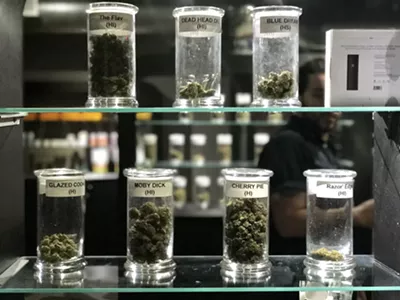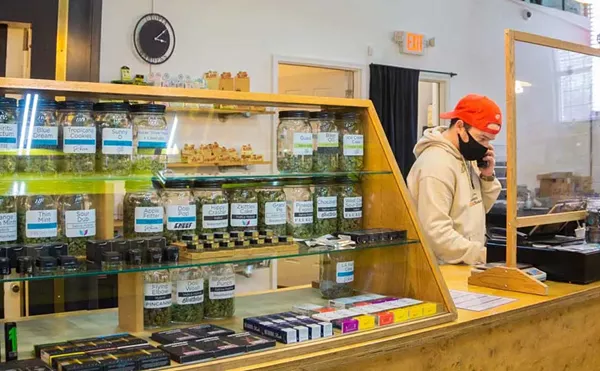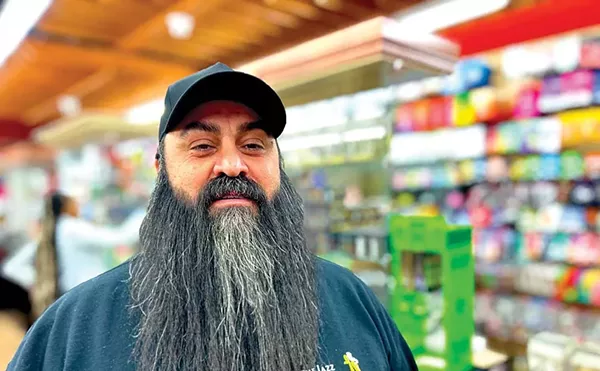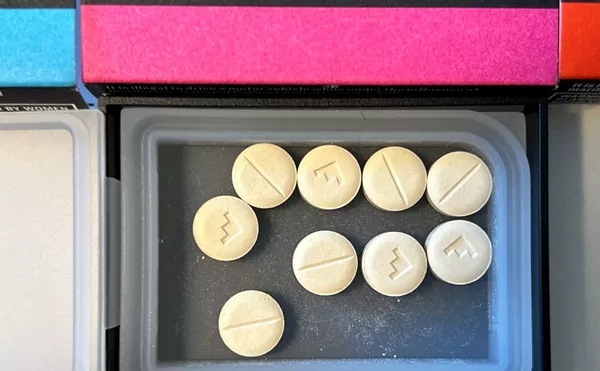
Audio By Carbonatix
[
{
"name": "GPT - Leaderboard - Inline - Content",
"component": "35519556",
"insertPoint": "5th",
"startingPoint": "3",
"requiredCountToDisplay": "3",
"maxInsertions": 100,
"adList": [
{
"adPreset": "LeaderboardInline"
}
]
}
]

When it comes to getting stoned, Michiganders prefer high-potency weed — even more than Californians do.
That’s one of the major findings in the 2022 “State of Cannabis Report,” published Tuesday by cannabis delivery platform Eaze.
The company used data from only California and Michigan for its report, since those are the two markets where the service has launched. One might assume Californians would prefer higher-potency pot perhaps due to a higher tolerance for THC, since California is the largest cannabis market in the U.S., and the fact that its recreational cannabis industry got a head start on Michigan’s.
But according to the report, the top three cities with a preference for potent pot were Ann Arbor (perhaps not a surprise considering it was ground zero for Michigan’s cannabis legalization movement, with its annual Hash Bash celebrations), followed by Grand Rapids, and Detroit.
According to Elizabeth Ashford, Eaze’s vice president of communications and public affairs, the data shows that when you look at overall sales on the platform, on average, the highest sales go to higher-potency products in those markets.
“We also saw that there tended to be more sales of concentrates and high-potency flower in colder months,” Ashford tells Metro Times. “So that may also have something to do with it. And I don’t want to derive any conclusions about that, because I don’t live in Michigan, but that might be part of it. Michigan is colder for more of the year than most of California, so that was one thing we posited.”
We can confirm, it does get friggin’ cold here. And with the pandemic still causing many indoor events to cancel, there’s not much to do these days than sit around and get stoned. (Or at least that’s what we’ve found.)
The report also found that men seem to prefer to purchase flower, while women seem to prefer edibles and prerolls. Relaxing, indica-heavy strains called wedding cake and glue were the top strains ordered.
Of all age groups, Gen Z purchased concentrates with the highest average THC content, with Millennials coming in a close second, followed by Gen X. But Baby Boomers also liked potent pot, purchasing flower products with the highest average THC year-round.
The report isn’t only about getting incredibly high, however. It also found that consumers, particularly Gen Z and Millennials, tend to be more socially conscious, and appeared to respond favorably to Eaze’s Social Equity Partners’ Program.
Municipalities across the country have enacted or considered social equity policies to help communities harmed by the war on drugs enter the booming legalized industry. Social equity policies include helping people with nonviolent drug offenses get licenses, as well as people from Black and brown communities, which have seen higher rates of incarceration for drug offenses than white communities despite similar rates of cannabis use.
Eaze highlights social equity brands in a special menu on its platform. According to Eaze’s report, there was an 89% increase in customers who purchased from Eaze’s Social Equity menu for the first time year-over-year from 2020 to 2021, and a 51% increase in the number of products sold from the menu. The sales were led by Gen Z and Millennials.
Since municipalities in California have been slow to issue social equity licenses, Eaze included brands that would be eligible.
“There’s a lot of conversation about the necessity for social equity licenses, and the purpose and value of them,” Ashford says. “But there hasn’t been a lot of information about them once you get them onto the market, or whether or not that narrative and that background matters to consumers.”
The interest in being socially conscious translates to big money: social equity brands brought in $6.5 million in 2021, a 72% year-over-year increase from 2020. According to Eaze, the social equity menu has pulled in $10.58 million in sales since its 2019 launch.
“The more you build it, the more consumers will come,” Ashford says. “I’m not saying it’s working in all cases and in all places, but it can work, and consumers will buy it — and not necessarily because it’s cheap, but because it has that imprimatur and that meaning.”
Ashford says the findings are important for regulators and licensing bodies to take note. “These licenses have a material impact on the businesses that are granted them,” she says. “And this is about building wealth for people who were hurt by the war on drugs over time. So that is all good news.”
Eaze used only data from California to measure the success of the Social Equity Partners’ Program, since it hasn’t launched it in Michigan yet. Ashford says the company plans to launch here later this year.
In Michigan, Detroit’s recreational cannabis market has hit a setback after a federal judge declared that a proposed social equity program that would give preferential treatment for granting licenses to longtime Detroit residents was unconstitutional. On Tuesday, Detroit City Council member James Tate released a new plan that would create two avenues for licensing, one for longtime residents and one for non-residents.
“I would say that this report makes a strong argument for moving forward with that as quickly as possible,” Ashford says.
She adds, “The goal of these programs is to put money in the pockets of people hurt by the war on drugs. We’ve seen that consumers will buy in, and we think that’s very important.”
Stay connected with Detroit Metro Times. Subscribe to our newsletters, and follow us on Google News, Apple News, Twitter, Facebook, Instagram, or Reddit.






